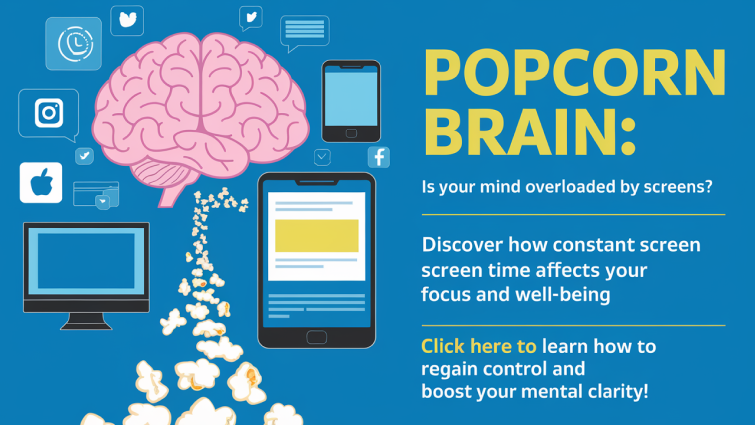What is Popcorn Brain?
Popcorn brain is a term used to describe a state where your attention span feels fragmented, your thoughts are scattered, and you constantly switch from one topic to another without much focus. This term, created by Dr. Mike Dow, helps explain how our brains get overwhelmed by constant digital stimulation. Imagine your brain popping like popcorn kernels—always jumping around quickly, instead of staying focused on one thing.
How Does Popcorn Brain Develop?
Popcorn brain develops when we spend too much time on screens, like phones, tablets, and computers. When we constantly receive new information—like social media updates or quick news alerts—our brains get used to this rapid pace. Over time, this constant bombardment trains our brains to crave instant gratification and fast changes, making it hard to focus on one thing for long periods.
How Do I Know if I’m Affected?
You might be experiencing popcorn brain if you find yourself feeling distracted and unable to concentrate. Signs include:
- Feeling like you have too many thoughts or tasks open at once, like having “100 tabs open” in your mind.
- Struggling to complete tasks or stay focused on one thing.
- Feeling more stressed, anxious, or tired than usual.
How It Affects Us
Popcorn brain affects our mental state and daily life in several ways:
- Attention Issues: It becomes hard to focus on one task for a long time.
- Mental Health: The constant need for stimulation can lead to increased stress and anxiety. You might feel overwhelmed or unhappy if you’re not getting enough instant rewards.
- Depression: Over-reliance on digital stimulation can sometimes lead to feelings of isolation and sadness, especially if you’re using screens as a way to escape from real-life challenges.
What Are the Risks of Popcorn Brain?
Here are some common risks associated with popcorn brain:
- Distractibility: You may find it hard to concentrate, leading to decreased productivity and focus.
- Anxiety: The overload of information can cause stress, feelings of sadness, and frustration.
- Difficulty Socializing: Relying too much on technology can make you feel less connected to people in real life and reduce motivation for real-world interactions.
- Physical Health Problems: Excessive screen time can negatively affect your sleep, posture, vision, and physical activity levels.
- Delayed Gratification: If your brain gets used to quick rewards from screens, you might struggle to handle situations that require patience.
How to Prevent Popcorn Brain
To manage and prevent popcorn brain, consider these tips:
- Limit Screen Time: Try to cut down on the amount of time you spend on screens. For example, allow yourself a short period of scrolling after completing a task, but not all the time.
- Organize Tasks: Make a list of tasks and prioritize them. This can help you focus on one thing at a time and reduce distractions.
- Turn Off Notifications: Avoid constant interruptions by turning off unnecessary notifications. Check messages and updates only at set times.
- Schedule Tech-Free Time: Set aside regular times for activities that don’t involve screens, like exercising, reading, or spending time with friends. Engaging in physical activities can be particularly helpful, as research shows it can reduce the negative effects of too much screen time.
By taking these steps, you can help your brain stay focused and balanced, reducing the impact of popcorn brain on your life.

